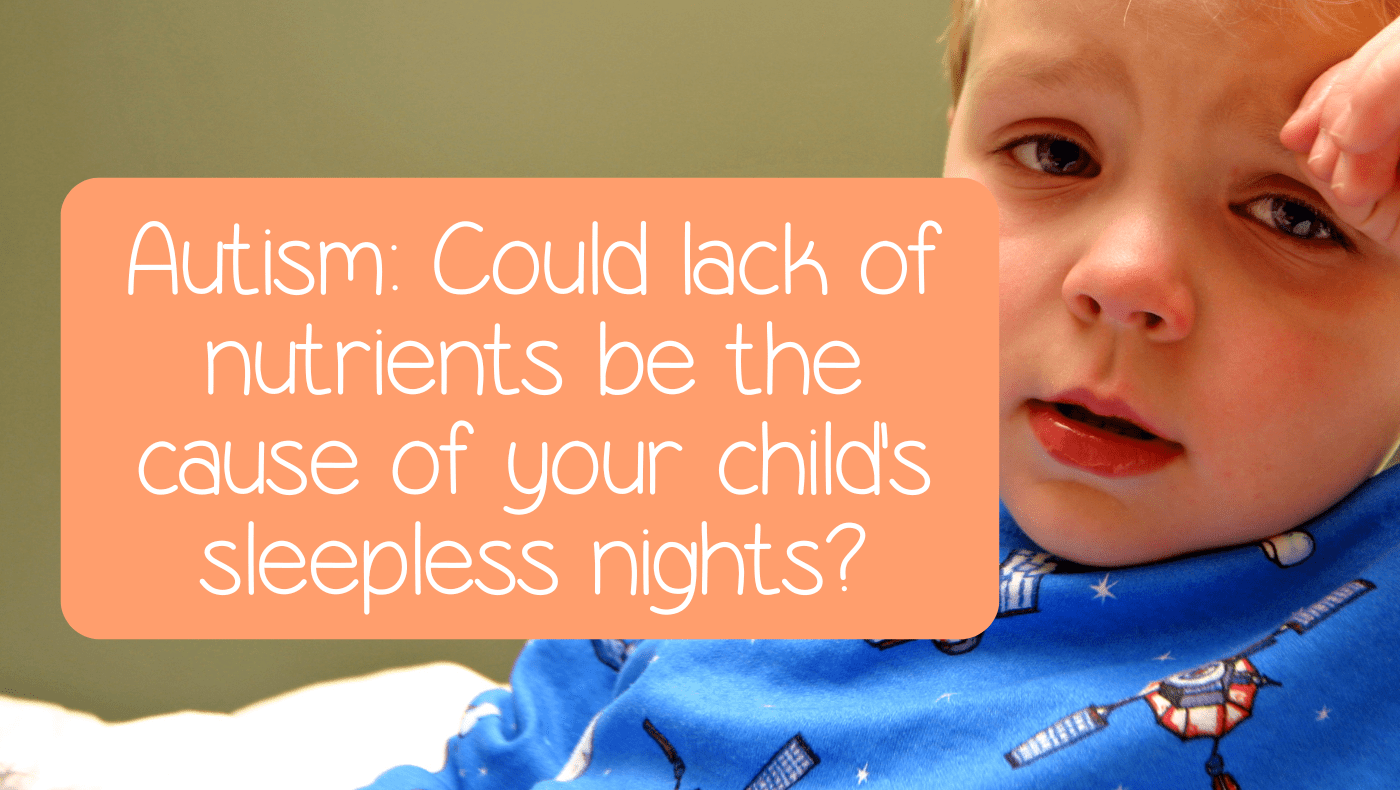Last updated on March 21st, 2025 at 08:42 am
As a parent of a child with autism, one of the most common issues you may face is dealing with sleepless nights. While there are many potential causes for restless sleep in children on the spectrum, one factor that often goes overlooked is nutrition.
Recent research has suggested that certain nutrients could be responsible for causing or worsening insomnia in some autistic children and this blog post will explore what those nutrients are and how to address them.
By understanding how dietary choices can affect your child’s sleep, you can make adjustments to their diet that may help improve their quality of restful sleep.
Nutrients that affect sleep
Nutrition could be the root cause of sleepless nights for your child with autism.
Certain vitamins and minerals have been linked to poor sleep in children on the spectrum, such as magnesium, zinc, B6, and iron.
Magnesium is known for its calming effects and its ability to reduce cortisol levels in the body, making it useful in aiding restful sleep.
Zinc deficiency has been linked to behavioral problems in autistic children which can lead to an inability to settle down for a full night’s rest.
B6 is known for its role in metabolism and nerve function; an imbalance or deficiency can cause insomnia.
Lastly, iron deficiency can be associated with daytime fatigue leading to nighttime insomnia.
All of these nutrients are important building blocks that help your body get the rest you need, so if any of them are lacking it can affect your child’s sleeping patterns.
Nutritional deficiencies and sleep
The nutrient deficiencies that can lead to sleepless nights in those with autism are not always obvious and can be hard to diagnose.
Supplementing with these nutrients may provide relief from sleeplessness in some autistic children, but before committing to this approach make sure you understand how nutrients as well as other external factors can affect sleep.
In addition to supplementing with vitamins and minerals, dietary changes may also help address sleeplessness in an autistic child; this includes avoiding processed foods high in sugar and artificial ingredients which can disrupt hormone levels leading to poor sleep quality.
Furthermore, eating healthy fats like omega-3 fatty acids found in fish oil has been shown to improve sleep duration and cognitive development.
Finally, ensuring adequate hydration throughout the day is also essential for good sleep; dehydration exacerbates fatigue resulting in more difficulty settling down at night time.
Disclosure: There are affiliate links in this post. If you click the link and buy something, I’ll get a commission at no additional cost to you! However, all my recommendations are things that I personally use because I know they’re clean and good quality products – not just anything with an “affiliate” label on it
Foods that improve sleep
Parents of children on the autism spectrum may have difficulty finding foods that can help improve their child’s sleep quality and duration.
Many children with autism have diets high in processed and sugary foods, which can lead to poor sleep.
To help these children achieve better restful sleep, it is essential to ensure they receive a balanced diet full of whole, nutrient-rich foods such as dark leafy greens, fruits, nuts, and seeds.
Consuming omega-3 fatty acids found in fish, chia seeds, and flaxseeds can also be beneficial for improving sleep.
Protein sources such as chicken and turkey can help promote relaxation before bedtime.
Additionally, complex carbohydrates like oats, quinoa, and sweet potatoes provide sustained energy throughout the night, which helps improve overall sleep quality.
Lastly, avoiding caffeine has been shown to be helpful in helping kids stay asleep longer at night.
Herbs that improve sleep
Overall, using herbal remedies to aid in better sleep in children on the autism spectrum can be an effective tool when used correctly.
Herbs have been used to support healthy sleep in children on the autism spectrum for centuries.
Lavender is one of the most commonly used herbs for this purpose, as its calming properties promote a sense of relaxation and can help reduce anxiety and stress.
Valerian root is another popular herbal remedy for improving sleep quality, as it increases the amount of gamma-aminobutyric acid (GABA) in the brain, which can induce a feeling of calmness.
Other popular sleep-inducing herbs include chamomile, lemon balm, passionflower, hops, kava kava, skullcap, and magnolia bark.
Herbal remedies can be taken in many forms, such as teas, tinctures, or capsules, depending on the individual needs and preferences of each child.
Mountain Rose Herbs has great quality herbs that can be purchased in teas, tinctures, or capsules, depending on what you prefer.
From chamomile tea prior to bedtime to valerian root supplements at night, there are plenty of natural options available for parents looking for ways to improve their child’s sleep quality without relying on pharmaceuticals or sedatives.
It’s important to note that while these natural remedies may help with getting better rest, they should not be used as a substitute for getting down to the root cause of why your child is having trouble sleeping.
By making minor adjustments to your child’s diet focusing on critical nutrients associated with good sleep quality, you may be able to improve their overall sleeping patterns over time, resulting in longer nights of deep slumber for both you and your little one!
Other considerations that can improve your child’s sleep
A consistent bedtime routine is also essential when establishing healthy sleep habits in children with autism.
This means developing a ritual that happens every night leading up to bedtime, such as taking a bath, brushing teeth, and reading a story together.
Children on the spectrum thrive on structure and consistency so having a pre-bedtime routine will help keep them calmer before going to bed each night.
One essential step is creating a sleep-friendly environment in the bedroom by avoiding clutter, noise, and electronics that can disrupt sleep patterns.
It may also be helpful to use blackout curtains or unique light-blocking window treatments to reduce sources of light that may interfere with sleeping.
Additionally, dim the lights before bedtime, as this will help your child’s body prepare for rest by releasing melatonin.
Sleep is an essential part of a child’s development and well-being, particularly for those on the autism spectrum.
Unfortunately, children with autism often struggle to get adequate sleep, which can cause issues with focus, behavior, and overall health.
Fortunately, there are numerous steps parents can take to improve their child’s sleep quality.
If you are looking for ways to improve your child’s overall health, check out my FREE resources.
Additional Resource:
- Check Out My Storefront





0 Comments